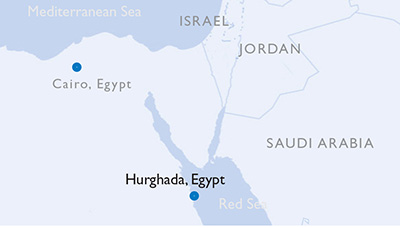Fire Aboard a Red Sea LiveaboardContents of this Issue: Paradise Taveuni, Taveuni Island, Fiji The Endless Acquisitions of Scuba Businesses Sharks Continue to be the Movie Villains Hugyfot Case Makes GoPro Serious Belize, Utila, Palau, Komodo, Bonaire Son of Australian Underwater Legend Sues Donít be a Diving Heart Attack Victim Surely Not Another Scuba Kickstarter? Fancy Buying a Dive Resort Operation in the Sun? That Kosrae Dive Resort Lottery Winner Why Donít Some Divers Drop Weights in an Emergency? More on those Disappearing Warships Great White v Orcas? Orcas Win Diving in Sri Lanka is Not All Bad Fire Aboard a Red Sea Liveaboard New 360 degree Underwater Camera, a Small Fortune How Safe to Fly After Diving? At Last, Some Empirical Evidence Editorial Office: Ben Davison Publisher and Editor Undercurrent 3020 Bridgeway, Suite 102 Sausalito, CA 94965 and a crew ill-equipped to deal with it from the June, 2017 issue of Undercurrent
"Next thing we knew, the smoke was thick and black, and flames had engulfed the galley and were coming out of the windows -- it seemed that water had been thrown onto a cooking-oil fire." It was May 13th. According to Ben Low, a British guest aboard the vessel MV Overseas, the boat had been chartered with a crew of eight from a company called Port Ghalib Divers and departed from Hurghada, Egypt. The 23 divers included French, Indian, Russian and Turkish divers and their own Egyptian dive-guide. Low told Undercurrent that 45 minutes from the home port, he saw "light white smoke coming from the galley towards the bow, and smelled burning cooking oil. None of the crew spoke to us -- they just disappeared with a tiny water extinguisher and a bucket of water. Things got worse, but we passengers were told nothing. "The captain shut off one engine and steered into the wind, causing the fire and thick smoke to be channeled through the boat towards where we were at the stern." Low tried to go below to warn a friend asleep in his cabin, but choking smoke made him retreat. Another British guest, Simon Marsden, managed to check the cabins and wake him, and he had to shout to the crew to persuade them to launch the dive inflatables and evacuate the boat. Low said that none of the crew tried to check the cabins or make sure everyone was present. There had been no safety briefing before departure, and he saw no fire-safety equipment other than the single extinguisher.
Most of the guests were wearing nothing but swimwear, and only three managed to recover their bags with passports, cash, cell phones and other valuables. A fishing-boat quickly picked up everyone, and a naval vessel transported them to its base in Hurghada. Low said a fireboat tried to put out the fire, but soon gave up. "It might have been too dangerous or intense." At the naval base, the group was given no information, but kept in a room with only "a couple of chairs and limited water and some dates to eat." Eventually, a representative from the British consulate took them to a hotel, assuring them that the boat operator would pay for accommodations and reimburse them.
After the dive guide had complained to the operator, the divers were eventually moved to a better hotel, and a woman who was on the boat donated clothes and shoes from her store in Hurghada. The Overseas was towed back to Hurghada and grounded on a sandbank, where another boat moored alongside the wreck, and their divers scavenged it. A few days later, when the guests were taken to the boat, they found opened bags and only a few waterlogged and broken items. Only two of the passengers recovered their passports, but money and other valuables were missing. The Egyptian dive-guide who later dived the wreck in search of property found all the cabins empty. With missing papers, it took the guests up to a week to clear immigration and return home. Apparently, the operator of the liveaboard, Ibrahim Ahmed Galal, has promised the group to compensate them for the lost trip "but only if they signed a contract to release him from any liability," which they refused to do. The seas are filled with inexpensive liveaboards for divers. If you decide to book a budget liveaboard trip, do your research, and for your own safety, make sure that your boat is not only fit to carry passengers, but also has firefighting and other safety equipment on board. (from an interview with Ben Low and other sources) |

I want to get all the stories! Tell me how I can become an Undercurrent Online Member and get online access to all the articles of Undercurrent as well as thousands of first hand reports on dive operations world-wide
| Home | Online Members Area | My Account |
Login
|
Join
|
| Travel Index |
Dive Resort & Liveaboard Reviews
|
Featured Reports
|
Recent
Issues
|
Back Issues
|
|
Dive Gear
Index
|
Health/Safety Index
|
Environment & Misc.
Index
|
Seasonal Planner
|
Blogs
|
Free Articles
|
Book Picks
|
News
|
|
Special Offers
|
RSS
|
FAQ
|
About Us
|
Contact Us
|
Links
|
3020 Bridgeway, Ste 102, Sausalito, Ca 94965
All rights reserved.

 "It was a run-down building with no toiletries including paper, towels, lights or air-conditioning," said Low. "We had to find our own food and water for the first night with the limited funds saved from the three bags." The company did not contact them.
"It was a run-down building with no toiletries including paper, towels, lights or air-conditioning," said Low. "We had to find our own food and water for the first night with the limited funds saved from the three bags." The company did not contact them.